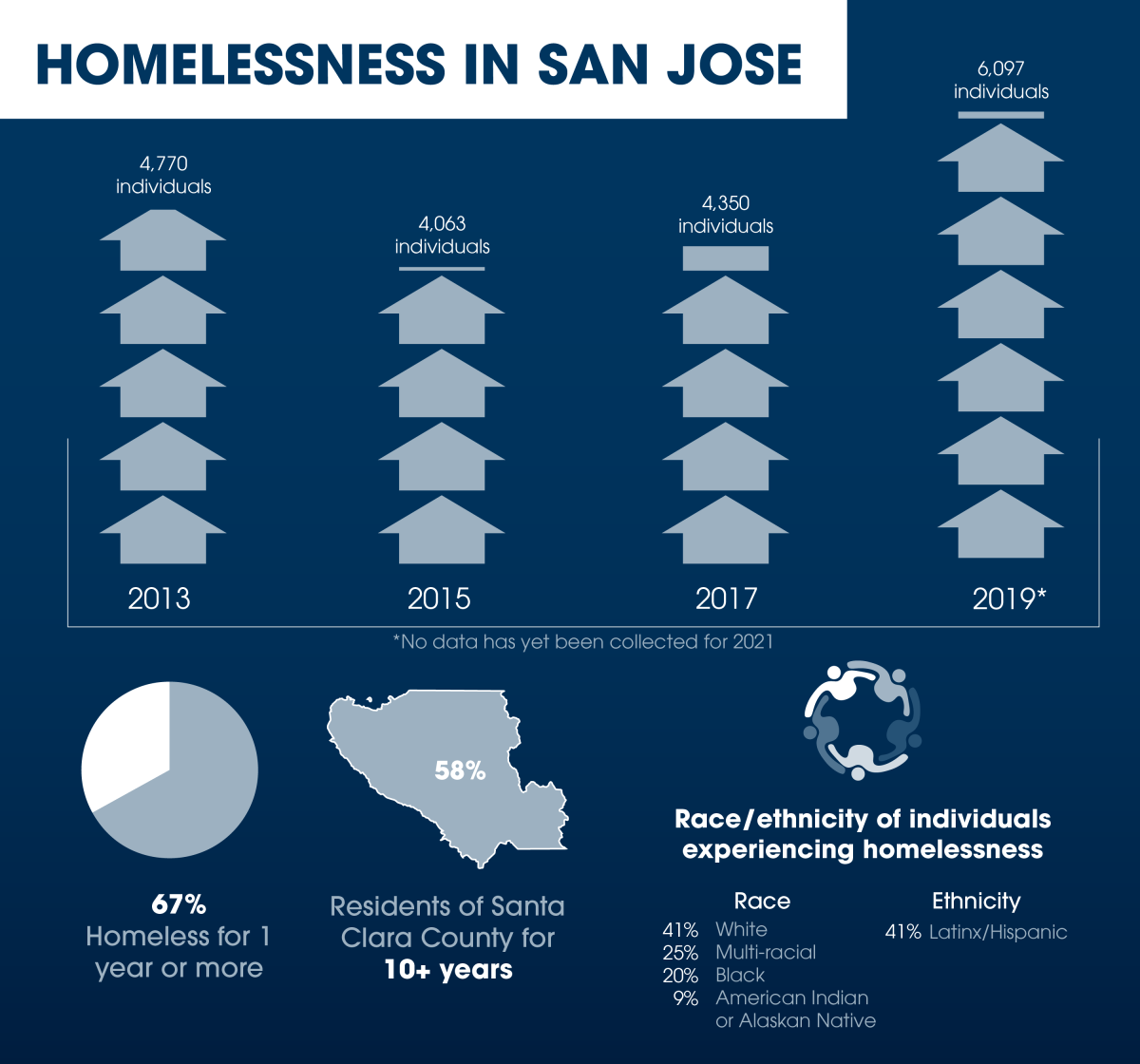The San Jose City Council has no empathy toward its homeless citizens after its recent vote to resume unethical encampment sweeps.
Many pass by homeless people without taking a moment to understand why they are in need.
There are currently around 6,097 homeless individuals in San Jose and around 1,782 of them are currently living in encampments, according to the city’s 2019 Homeless Census and Survey Comprehensive Report. However, it’s quite possible these numbers are larger given the difficulties of counting those without homes.
Many homeless individuals have been long-time residents of Santa Clara County, with 58% calling the county home for more than 10 years, according to the same City of San Jose report.
I’ve enjoyed spending personal time connecting with the homeless community and in the past I’ve helped to provide food and clothes during the holidays.
If people led with empathy rather than judgement, they’d understand that no matter how they got to their positions, they’re hurting and need a helping hand.
Of those who reported homelessness to the City of San Jose, the top three responses to obstacles in finding permanent housing were not enough income, being unable to afford rent and no available housing.
Many homeless individuals also deal with health issues city councilmembers refuse to address.
Among the top health conditions, 42% reported psychiatric and mental health issues, 36% battle addiction, 31% have PTSD and 24% have a physical disability.
Instead of offering assistance to the homeless community, San Jose City Councilmembers voted in favor of resuming sweeps of city encampments, according to previous reporting from the Spartan Daily.
There are currently 220 mapped encampments across the city and these sweeps are cruel and will further spread the coronavirus to an already vulnerable population.
The Centers for Disease Control and Prevention outlined how city officials must address homeless populations during the pandemic and stated that officials should allow people to remain where they are, including encampments.
San Jose City Council has clearly ignored these guidelines. In fact, moving homeless encampments is the city’s top priority during the next fiscal year, according to a March 16 San Jose Spotlight article.
Encampment sweeps during a pandemic are extremely dangerous because homeless individuals are at high risk of contracting COVID-19.
By disrupting those living in encampments, the city limits access to available resources and information by uprooting communities from familiar surroundings.
The city should instead make improvements needed through city services to ensure cleanliness of encampments.
This could include resources such as bathrooms specifically for the homeless, handwashing stations, mobile showers and employment assistance.
Sweeps are ineffective because homeless people will be forced to eventually find a new location and rebuild.
Whether they’re living in tents, cars or on sidewalks, sweeps strip any shred of dignity left.
City council should implement permanent housing and services more widely to help those in need.
So far, the city has been building tiny houses near the Berryessa BART station and at the California Department of Transportation property southwest of the overpass connecting interstates 280 and 680, according to Feb. 27, 2020 NBC Bay Area article.
Government officials should also launch a federal tax relief fund for hotels where homeless folks can stay.
Gov. Gavin Newsom issued an executive order in March 2020 that allows the state to control hotels and medical facilities to treat COVID-19 patients, according to a March 12, 2020 KTLA5 article.
But what about prevention rather than treatment? Providing separate rooms to homeless individuals will mitigate outbreaks in places with high rates of homelessness.
Some might say homeless people are threats to public safety. However, in the current state the world is in, the real threat is not providing safe housing and enough outreach services.
If the city truly cared about public health, they would stop citing homeless people in encampments and focus on the real issue of providing people with concrete opportunities for housing.
The way homeless people are treated isn’t right and there must be more consideration toward their living conditions.






































